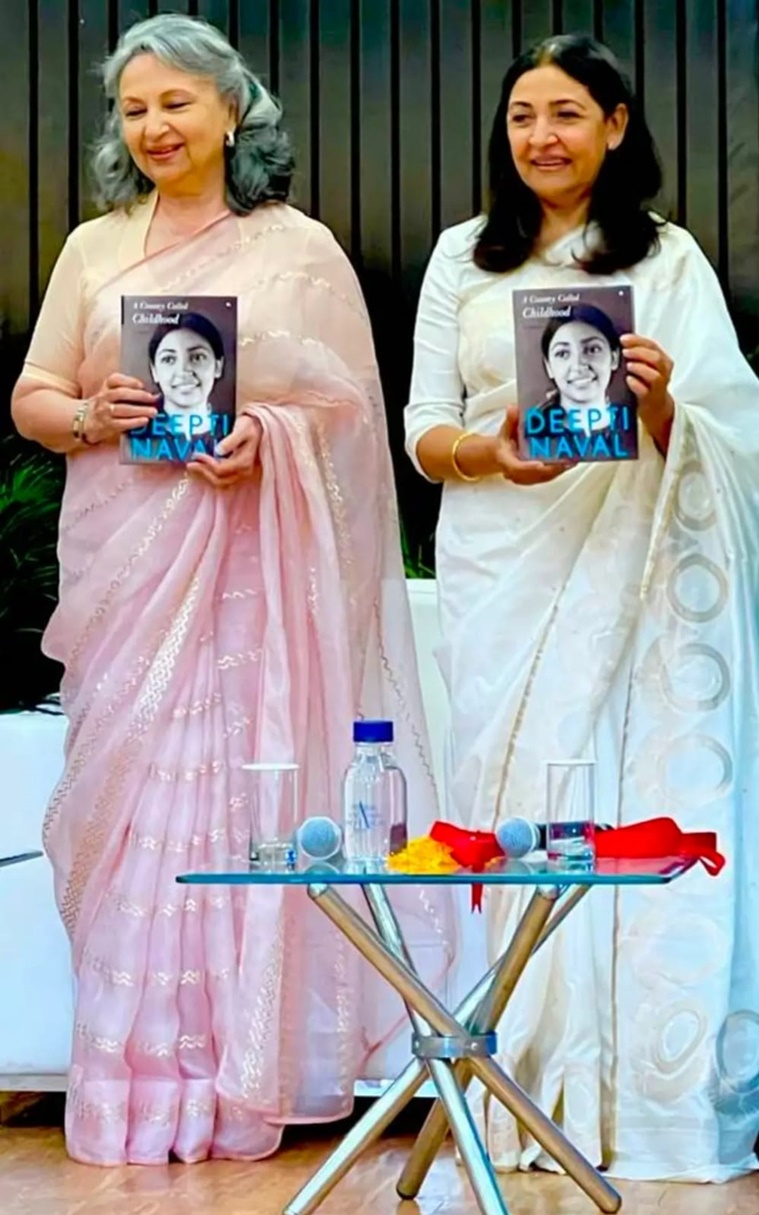Deepti Naval: Writing this book was almost cathartic, a process of realisation about myself, and my parents
At the launch of her new book ‘A Country Called Childhood: A Memoir’, actor Deepti Naval spoke of her childhood memories and stories, her syncretic upbringing, historical events that uprooted her family, and how she wanted to understand all the sides
 Deepti Naval's memoir 'A Country Called Childhood' is also a love letter to Amritsar, the place she grew up in the tumultuous 50s and ’60s. (Photo Credit: PR Handout)
Deepti Naval's memoir 'A Country Called Childhood' is also a love letter to Amritsar, the place she grew up in the tumultuous 50s and ’60s. (Photo Credit: PR Handout)A teenaged Deepti Naval once decided to not speak for a whole season. She’d been impacted by Sharmila Tagore from Anupama (1966) — who “did not utter a word in the entire movie and only communicated through her eyes”. On Tuesday, Tagore was the chief guest at the release of Naval’s new book, A Country Called Childhood: A Memoir (Aleph Book Company), which was launched by Kolkata non-profit Prabha Khaitan Foundation under its Kitaab initiative at the India International Centre in Delhi. The evening was also attended by former Puducherry Lieutenant Governor and IPS officer Kiran Bedi and artist Jatin Das, and the conversation was moderated by journalist-author Kaveree Bamzai.
Buy Now | Our best subscription plan now has a special price
“Childhood for most of us is another country; that is very, very dear to us. The textured memories of which shape who we are/become. It comforts and heals us,” said Tagore speaking about Naval’s book, which she said she’d “treasure”, and that while reading it, she “felt many emotions, but the uppermost emotion was unadulterated joy…Going through her journey tempts you to look at yours and explore your own journey.”
Writing the book, for Naval, was “almost cathartic”, “a whole process of realisation, about myself, and especially about my parents” — it gave her a chance to reflect on herself and trace where she was going. The book is also a love letter to Amritsar, the place she grew up in the tumultuous 50s and ’60s, or Ambershire, as her Catholic school nuns would say, and, even more so, to her parents, excavating who they were, where they came from, what made them, their history, and in turn the evolving history of a country.
 Recalling the good times they spent together, Tagore spoke of how Naval has always been “soft-spoken, gentle, yet gritty (Photo: PR Handout)
Recalling the good times they spent together, Tagore spoke of how Naval has always been “soft-spoken, gentle, yet gritty (Photo: PR Handout)
The story of an unconventional Punjabi family, surrounded by the distinctive sights, smells, and sounds of a fast-vanishing India: single-screen theatres, people/professions such as kaliwallah (gilder). How her grandparents’ families were uprooted because of events like World War II and Partition. How the children became aware of the India-China and India-Pakistan wars of the ’60s. Naval’s equation with the “maseet” (mosque) next door and how the azaan and havan would co-exist. How she enjoyed cleaning vessels with raakh. How her Myitkyina-based mother’s family had to undertake the tortuous journey on foot to Lahore (which was in India then), when the Japanese attacked Burma — this exodus “isn’t often spoken about,” she complained. How the Jalalabad massacre impacted her Hindu grandfather and how an old Muslim tongawalla saved the lives of three girls, including her mother — “it’s about the sorrow and tragedy on both sides. I wanted to see all sides,” she said. How her Jan Sangh-supporter Bauji (paternal grandfather) and Congressi Bibiji (paternal grandmother) had a respectful married life. How her lawyer grandfather would unwind by catching some portions of a film playing at a theatre every evening. The triumph of growing a little taller to see her face in the mirror of a hat-stand, which would be the only thing she kept after selling the ancestral house, which she regrets now. Of wanting to be like Meena Kumari, Sadhana and Sharmila Tagore. How her father, aged 48, would leave for America and start life from scratch, among others.
The journey was “enriching”, to know “how they struggled to make our lives?” “How do they feel about their own lives? To make joyous even things that are difficult to be spoken of,” said Naval, who’s worked in more than 90 films, including Chashme Buddoor (1981), Saath Saath (1982), Katha (1983), Mirch Masala (1986), Leela (2002), Firaaq (2008), Memories in March (2010), Listen… Amaya (2013), NH 10 (2015), etc.
“Every time I’d go to New York, I’d sit with a recorder, asking them (her parents) to recollect, to recall their lives,” said Naval, a wearer of many hats: an actor, director, poet, short-story writer, painter, and photographer, adding, “at times, it was unnerving. I wanted them to read the book, but, in the last few years, they are gone.”
Recalling the good times they spent together, Tagore spoke of how Naval has always been “soft-spoken, gentle, yet gritty, with clear vision, constantly expanding her boundaries, a sensitive actor, poet, filmmaker, but above all, a thinker” who delves into this book of “evocative vignettes” (family photographs and anecdotes from all stages of her life) with “admirable honesty”.
📣 For more lifestyle news, follow us on Instagram | Twitter | Facebook and don’t miss out on the latest updates!
- 01
- 02
- 03
- 04
- 05































